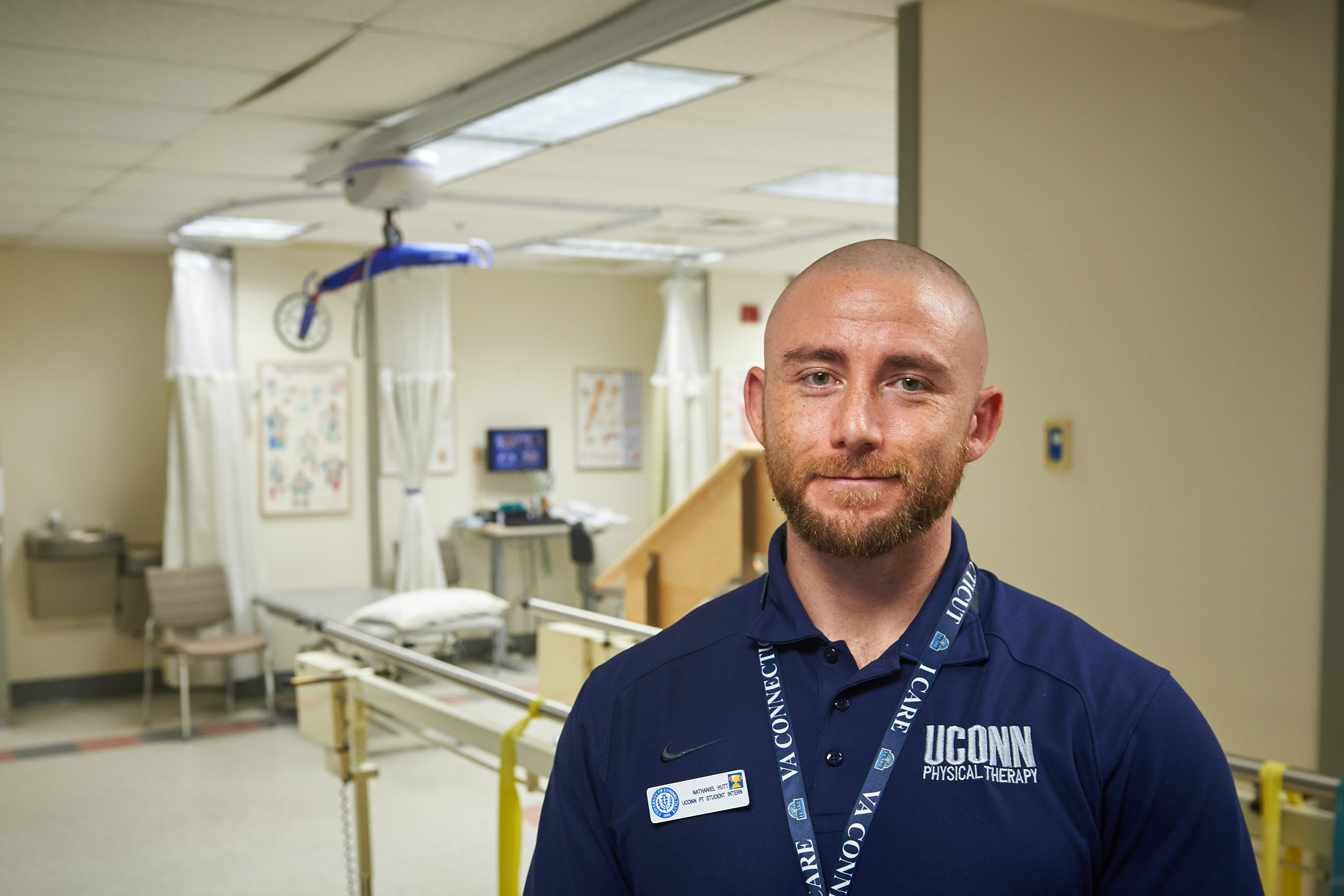Nate Hutt is completing a doctor of physical therapy degree in the Department of Kinesiology. After serving in the military, he is focusing on physical therapy to help wounded veterans. He was interviewed for a post that was first published in the College of Agriculture, Health, and Natural Resources’ newsletter Naturally@UConn.

Where did you study as an undergraduate?
I received my associate degree from Quinebaug Valley Community College in 2004 and completed my bachelor’s degree online through American Military University in 2012 while I was serving in the Marine Corps. I completed my prerequisites for the physical therapy program at Eastern Connecticut State University after I left the military in 2013.
What was your major?
My associate degree is in liberal arts and sciences. My bachelor’s is in security management and counterterrorism studies.
Why did you decide to go to graduate school?
I had always intended on staying in the military in a combat role, but when I was in Libya in 2013 my priorities changed. I decided that I wanted a career that wouldn’t require me to travel and be away from home all the time, and wouldn’t stress my family out so much. I also wanted to find a career that would allow me to help other veterans and service members. Given my background in both tactical fitness and as a CrossFit coach, helping to heal them with exercise just seemed like the best option for me.
Who is your advisor?
The great and wonderful Laurie Devaney, physical therapist extraordinaire!
What is your field of research?
I am currently in my third year of the physical therapy program here at UConn. The most exciting research that I’m involved in right now is attempting to identify a new subtype of Parkinson’s disease in Agent Orange-exposed veterans as well as defining DaT scan image findings so they can be used to stage the severity of the disease. My specific fields of interest at this point are all over the place – neurological rehabilitation, orthopedics, amputee rehab, even pediatrics. We’ll see where life takes me though!
Name one aspect of your work that you like.
I love that my profession allows me to prescribe physical activity as medicine. I had given thought to other health care fields, but I don’t exactly subscribe to the usual medical model of patient care. I’m skeptical of most pharmaceuticals, and hesitant to ever recommend that a person get surgery. Exercise and nutrition are, in my opinion, the most underutilized yet necessary components to healing and recovery. I’m confident that the rehabilitation program that I build for my patients will benefit them, without the risks and doubts that often come with medication and surgery.
What do you feel is your greatest accomplishment so far?
My clinical affiliation with Walter Reed Army Medical Center, which I’m currently completing. It was a highly competitive selection process, and now that I’m there it’s extremely demanding, but there’s nowhere else I’d rather be. I’m seeing some of the bravest patients in the world, and I feel beyond honored to have a hand in their care.
What do you hope to do once you get your degree?
I will probably re-join the military as a physical therapist so that I can use my new skill set to heal our nation’s heroes. There are other populations that I care deeply for as well, but the men and women that volunteer to risk their lives for the people I care about will always hold a special place in my heart.
Is there anything else you would like us to know about you?
I was the most unlikely person ever to end up at UConn studying to be a doctor of physical therapy. I grew up poor in a bad area. I got kicked out of high school and had to earn my GED. I was homeless for a period when I was younger. Even just a few years ago, I never would have thought that I would be in a doctoral program, about to be a licensed health care professional today. If you’re considering graduate school but doubt your potential, let me use this chance to tell you to get out there and go for it. Don’t wait for opportunity to find you. Just go out there and make your own luck. Figure out what you want, make a plan and execute. It’s your world – we all just live in it!



